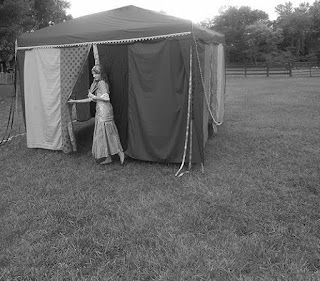Minimalism vs. Poverty
In
discussing Poverty, it is important to differentiate her from her similarly-appointed
fellows, namely minimalism, destitution, and simplicity.
Nowadays, minimalism
is the fad and trend, but in reality, the impulse to minimalism is about as old
as materialism, and I believe the two are related. Materialism expansively
says, “Take whatever you like!” while Minimalism says, with a hint of a
wrinkled nose, “Of course, it would be gauche, it would be uncouth, it would be
so off-trend to take it all. You only want a slim fraction of it; you want to
curate a collection of the Few Very Best. One mustn’t look greedy.” But yet,
the apparent generosity of Materialism and the apparent ascetism of Minimalism
are both a sham. Both are in thrall to money, and hence neither can ever
satisfy. A whole industry has been built up around these two heiresses, an
industry ostensibly geared to generate minimalism, which inevitably results in
more storage units. Every season we are exhorted to simplify, simplify,
simplify by getting rid of stuff, but the very next buying cycle, we are
encouraged to update, splurge, redecorate, and restock, thus creating glut---
thus the cycle continues and expands. Minimalism
is in many ways driving the discretionary consumer economy these days, and so
it will continue, as long as the dragons of catastrophic wealth keep us captive.
The ideal
of simplicity, especially solitary simplicity, periodically affects the
American mind like a virus that is activated by the cancer of materialism. Not
a few Americans have cast off all obligations and set off for the wilderness,
only to return to write a book or start a speaking tour. Only in America, heavy
with the bounty of good harvests and ample forests, could such forays be
indulged in. “The world is too much with us,” as Wordsworth observed, and not
only the Catholic Hopkins agrees that, “all is seared, bleared, smeared with
trade, and shares man’s smell.” But casting it all off, only to drift back,
unconverted, may cure the fever but not the tumor.
Minimalism
is not poverty, although it might resemble it in its superficialities. Minimalism
is something. Poverty is a nothing. Poverty means recognizing that someday, all
the carefully curated treasures will be so much rubbish in someone else’s
storage shed, yard sale, estate auction, or landfill detritus, and the hands
that clutch them, the brow that creases, and the mind that pulses with anxiety
will be skeletal, the skull empty of it all. Since we cannot keep it,
ultimately, we hold it loosely, stewarding it until the Master calls, in the
form of a beggar, an annoying relative, a friend in need, strangers in distress.
The
poverty Christ blessed is not destitution. I hope I can be specific here, for it is difficult. He bade us not worry about what to
eat, drink, or wear, saying that our Heavenly Father would provide for us.
Those who lack food, water, and clothing are truly destitute, and we should
help them immediately. That is the call of the Gospel.
When we
lack these necessities—and there are times our family has lacked them—we are
urged to call out to God, addressing Him lovingly as our Heavenly Father, and
asking Him to provide for us. Then we must beg the Holy Spirit to open our eyes
and our ears to hear Him, so that we can recognize His daily provision. If we
are to live from day to day without these necessities, we must calm our hearts
and look to Him expectantly. “Has anyone trusted in the Lord and been
disappointed? Or cried out to Him and been ignored?” asks Sirach in his second
chapter. Again, sometimes the stealthy hand of God is visible only in
hindsight: the Scriptures teach us we must constantly look back upon our own
spiritual history to catch Him in the act. When you are in desperate need, look
back at your previous times of need and discern His provision. You will be
surprised how often you will find He was there, caressing you, when you thought
you wept in an empty room.



Comments